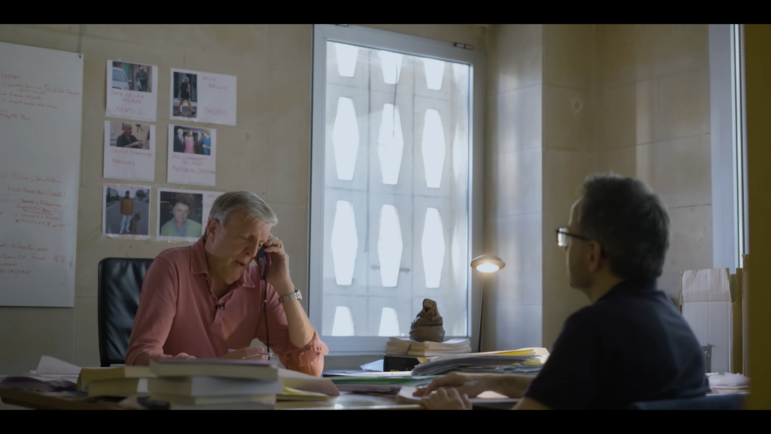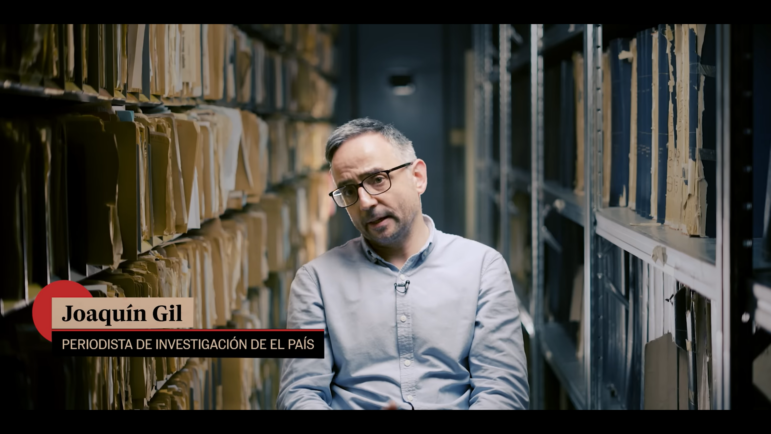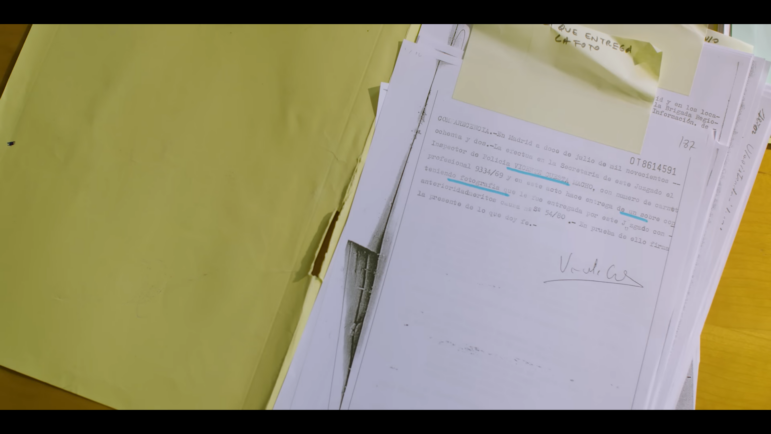
José María Irujo, left, and Joaquín Gil, right, call one of the fugitives to ask about their alleged involvement in crimes that took place during Spain’s transition to democracy. Image: Screenshot, El País documentary.
After the death of dictator General Francisco Franco in 1975, the reins of power were taken back from the far right in Spain. But as the old regime crumbled, and democracy was slowly restored, the country experienced a series of attacks carried out by groups of neo-fascists.
There was the case of Yolanda González, a young woman with leftist views who was kidnapped and murdered in 1980. There was the 1977 Atocha massacre, where gunmen killed three labor lawyers, a law student, and an administrator in Madrid. And one of Spain’s leading newspapers — El País — was targeted in a 1978 letter bomb attack. A number of staff were injured and one was killed.
Despite the serious crimes committed, as the years went by and investigative leads went dry, these cases were either forgotten, or closed, by Spanish authorities. To provide some measure of accountability, a decade ago two journalists from El País began tracking down the culprits in long-neglected attacks like these.
“Our hope is that some of the cases are reopened. Our work is a homage to the victims, so they know where the murderers of their daughters, sons, wives, husbands, fathers, mothers, are,” said José María Irujo, head of the investigative unit at El País. “With our investigations we are calling out the impunity these criminals enjoy.”
How It Began
While there were arrests and trials in the aftermath of some of the attacks, a number of those implicated in the cases managed to serve shorter sentences, while others disappeared before being brought to justice. For years, it seemed their cases had been shelved or forgotten. Although a handful of the suspects were listed as “wanted” by organizations like Interpol, many of the cases officially “expired,” or were closed when the trail went cold.
But Irujo, together with fellow El País investigative journalist Joaquín Gil, set out to go after those responsible, even if that meant finding the fugitives abroad.
While juggling the demands of their day jobs, they decided to make the investigation a personal project, digging away, clue by clue, after other deadlines. From even the early days, it seemed likely that some of those involved in the attacks had eluded justice by making a fresh start overseas.
Their first lead involved a man accused of being behind the murder of Yolanda González. An investigation by Irujo showed how, after he served only 14 years of a 43-year prison sentence, he changed his name and moved to Paraguay where he set up a company and provided services to the military government. Later, back in Spain, he became one of the main advisers of the Civil Guard, working with the police on issues such as terrorism and organized crime.
Many people were outraged by the findings of the investigation. That reaction prompted Irujo and Gil to look into whether other members of the far-right involved in similar cases might also have fled across the Atlantic.
“Finding names of other fugitives was easy,” Irujo explained. “From 1978 to 1982, there were many right-wing terrorist attacks that appeared on the covers of various newspapers. In the archives we were able to find their names. In the building of El País itself, in the archives, we looked in thousands and thousands of folders. And we made a list.”

Investigative reporter Joaquín Gil in the archives where many of their leads were found. Image: Screenshot, El País
A key resource for tracking down additional subjects, Irujo said, were judicial documents, which he called “real treasures.” These documents included key data like physical characteristics and names of known associates. The reporters also looked into the far-right in other Spanish-speaking countries and followed the political preferences and activities of fugitives who had ties to Fuerza Nueva, a Spanish right-wing political party.
The pair examined property and company registrations, social media, and looked into people close to the suspects, such as parents, partners, and friends. Eventually, the team realized that many of these fugitives had fled to Latin America. History played a role here. During Franco’s dictatorship — and in the years after his death — governments from countries like Paraguay and Chile had political views sympathetic to the right wing and had accepted other Spanish fugitives with little objection.
It was difficult to track people across such a huge region, but Gil and Irujo reconstructed each case, and each attack, in great detail, searching newspapers, local police records, and documents from international organizations like Interpol. “We also tried to contact family members of the fugitives. But that failed, they were tombs of silence,” Irujo told reporters at the COLPIN conference last November.
Finding Fugitives Abroad
Once they had narrowed down a fugitive’s possible location, they used online research and phone calls to corroborate their suspicions. Gil and Irujo were surprised to find some of the suspects still using their original names — and that official registries often led directly to them.
A simple tactic they used to make first contact was to look for online ads. For example, if they found a potential suspect had placed an ad about renting an apartment or selling a motorbike, the journalists would have an associate reach out to confirm the identity, initially posing as an interested buyer. (They found that hiring women with a local accent to make the first call didn’t raise suspicions and produced the best results.) If the target decided to “bite,” they moved to the next stage — finding them, whether that meant looking in a favela in Brazil or a middle-class neighborhood in the Dominican Republic.
Though the fugitives were much older, tracking down alleged murderers, even if they were in their 60s or 70s, brings risks. In some cases, when the reporters felt in danger, at first they did not tell the fugitives that they were reporters. And when trying to take pictures of one suspect, who lived in a favela in Brazil, they hired a local photographer, well-known to people in the neighborhood.
“When investigating these types of fugitives, you always have in mind, one day they are going to come and get me,” Irujo said. But despite the safety concerns, meeting these individuals face to face paid huge dividends for the reporters, and led to some remarkable confessions.

Parsing through court documents and other records, the journalists were able to identify names and other characteristics of the fugitives, plus find links to possible associates. Image: Screenshot, El País
“In 2015 we went to a favela in Guarujá [near Sao Paulo, Brazil] and the head of the command that led the attack on the newspaper lived there,” Irujo said. “When we talked to him, he seemed to have no regrets.” Their article highlighted the following quote from the fugitive: “When I arrived in Brazil… my trial began in Spain. I laughed out loud. I was in Rio de Janeiro, Brazil! Do I get 20 years in jail? Spend 20 or 25 years of my life in prison? No, under no circumstances. I love freedom.”
The man denied being behind the newspaper attack, and laughed while telling the reporters that, in 30 years, “no one came to look for me.”
The pair found a second fugitive on their list, running a modeling agency in Paraguay and living among many other right-wing exiles. They talked to him on the phone and he also expressed no regrets about his past.
The latest case took Gil and Irujo to Mexico, where two fugitives were living. The reporters had found properties listed online under one of the fugitive’s names in the state of Guanajuato. One of the targets had become a Mexican citizen.
“It’s not easy, these are really complex investigations, and if you don’t have an obsession, to hunt down — metaphorically — these people, to reach a place where the police and the justice system haven’t been able to, for lack of interest, information, or other motives, you won’t manage to do it,” Irujo said in an El País video related to the investigation.
So far, the duo has published a number of articles and videos about their investigative series, “The Far-Right Fugitives.” And they aren’t done yet.
Their latest story has been picked up and followed by the Mexican media. And just a few days after the investigation identifying the fugitives living in Mexico, the Spanish government officially recognized that two of the fugitives’ victims died from far-right terrorism.
“These journalistic investigations brought concrete consequences, something rare in the profession,” Fermín Grodira, who works for the independent Spanish media outlet Maldita.es, told GIJN. Further, he adds, the project uncovered “international protection networks for extreme right-wing assassins in Latin America and how these people even came to collaborate with the Spanish state security forces.”
Final Recommendations
Tracking down fugitives overseas might seem like the stuff of spy novels, but Irujo has some tips for reporters who suspect alleged criminals from their country may be living elsewhere.
“Investigating and developing a story like this one is hard,” he cautioned. “Your bosses will probably tell you ‘Yes, go for it, but what do you have for next week, or next month? Don’t talk to me about a story that will take two or three years to investigate.’” Few outlets have the resources to support reporters traveling to multiple, international destinations, and even to fund the time spent on these kinds of stories.
But they offer some key points to make a story like this work:
- Make sure you find the story itself interesting, because you will have to become obsessed with the topic.
- Be tenacious and determined to follow the story where it takes you.
- Set clear goals.
- Don’t give up, but don’t expect immediate progress. Investigations like this might take several years.
Finally, Irujo said that the key to the success of the project was perseverance. They were very passionate about the investigation and wanted family members of the victims to know that those accused of these crimes were still free, living without restrictions in other countries.
“It has become a mission for me, to work for the families of the victims. To tell them where the murderers of their family members are. To me, that is very important.” he said. “We have found five out of the seven fugitives we have on our list. We will not rest until we find them all.”
Additional Resources
Latin America’s Leading Investigative Reporters Take Their Stories to Rio
My Favorite Tools with Freelance Journalist Théo Englebert
Editor’s Pick: 2022’s Best Investigative Stories from Latin America
 Andrea Arzaba is a journalist and GIJN’s Spanish editor. As a reporter and media professional, she has focused on documenting the stories of people in Latin America and Latinx communities in the US. She is an International Women’s Media Foundation fellow and part of Transparency International’s Young Journalists Program.
Andrea Arzaba is a journalist and GIJN’s Spanish editor. As a reporter and media professional, she has focused on documenting the stories of people in Latin America and Latinx communities in the US. She is an International Women’s Media Foundation fellow and part of Transparency International’s Young Journalists Program.